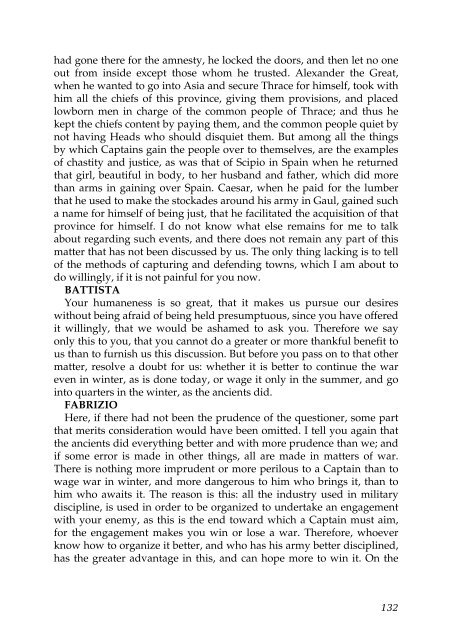Create successful ePaper yourself
Turn your PDF publications into a flip-book with our unique Google optimized e-Paper software.
had gone there for the amnesty, he locked the doors, and then let no one<br />
out from inside except those whom he trusted. Alexander the Great,<br />
when he wanted to go into Asia and secure Thrace for himself, took with<br />
him all the chiefs <strong>of</strong> this province, giving them provisions, and placed<br />
lowborn men in charge <strong>of</strong> the common people <strong>of</strong> Thrace; and thus he<br />
kept the chiefs content by paying them, and the common people quiet by<br />
not having Heads who should disquiet them. But among all the things<br />
by which Captains gain the people over to themselves, are the examples<br />
<strong>of</strong> chastity and justice, as was that <strong>of</strong> Scipio in Spain when he returned<br />
that girl, beautiful in body, to her husband and father, which did more<br />
than arms in gaining over Spain. Caesar, when he paid for the lumber<br />
that he used to make the stockades around his army in Gaul, gained such<br />
a name for himself <strong>of</strong> being just, that he facilitated the acquisition <strong>of</strong> that<br />
province for himself. I do not know what else remains for me to talk<br />
about regarding such events, and there does not remain any part <strong>of</strong> this<br />
matter that has not been discussed by us. <strong>The</strong> only thing lacking is to tell<br />
<strong>of</strong> the methods <strong>of</strong> capturing and defending towns, which I am about to<br />
do willingly, if it is not painful for you now.<br />
BATTISTA<br />
Your humaneness is so great, that it makes us pursue our desires<br />
without being afraid <strong>of</strong> being held presumptuous, since you have <strong>of</strong>fered<br />
it willingly, that we would be ashamed to ask you. <strong>The</strong>refore we say<br />
only this to you, that you cannot do a greater or more thankful benefit to<br />
us than to furnish us this discussion. But before you pass on to that other<br />
matter, resolve a doubt for us: whether it is better to continue the war<br />
even in winter, as is done today, or wage it only in the summer, and go<br />
into quarters in the winter, as the ancients did.<br />
FABRIZIO<br />
Here, if there had not been the prudence <strong>of</strong> the questioner, some part<br />
that merits consideration would have been omitted. I tell you again that<br />
the ancients did everything better and with more prudence than we; and<br />
if some error is made in other things, all are made in matters <strong>of</strong> war.<br />
<strong>The</strong>re is nothing more imprudent or more perilous to a Captain than to<br />
wage war in winter, and more dangerous to him who brings it, than to<br />
him who awaits it. <strong>The</strong> reason is this: all the industry used in military<br />
discipline, is used in order to be organized to undertake an engagement<br />
with your enemy, as this is the end toward which a Captain must aim,<br />
for the engagement makes you win or lose a war. <strong>The</strong>refore, whoever<br />
know how to organize it better, and who has his army better disciplined,<br />
has the greater advantage in this, and can hope more to win it. On the<br />
132
















